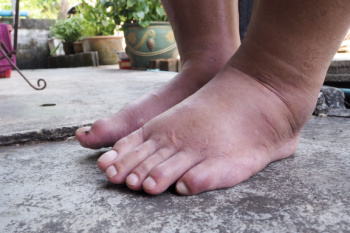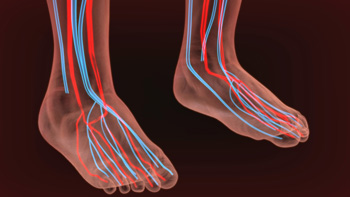Connect With Us
Blog
Items filtered by date: June 2025
What Is Tarsal Tunnel Syndrome?

Tarsal tunnel syndrome is a condition caused by compression of the posterior tibial nerve as it passes through the tarsal tunnel near the ankle. This nerve entrapment can result from injury, swelling, flat feet, or medical conditions like arthritis or diabetes. Symptoms include tingling, burning, numbness, or shooting pain in the ankle, heel, or sole of the foot. Risk factors include repetitive motion, improper footwear, and structural foot problems. A podiatrist can diagnose the condition through physical examination and testing, then recommend treatments, such as orthotics or anti-inflammatory care. If you are experiencing these symptoms, it is suggested that you consult a podiatrist for expert evaluation and a plan to restore foot comfort and function.
Tarsal tunnel syndrome can be very uncomfortable to live with. If you are experiencing tarsal tunnel syndrome, contact one of our podiatrists of Mt Rose Foot & Ankle Specialists. Our doctors can provide the care you need to keep you pain-free and on your feet.
Tarsal Tunnel Syndrome
Tarsal tunnel syndrome, which can also be called tibial nerve dysfunction, is an uncommon condition of misfiring peripheral nerves in the foot. The tibial nerve is the peripheral nerve in the leg responsible for sensation and movement of the foot and calf muscles. In tarsal tunnel syndrome, the tibial nerve is damaged, causing problems with movement and feeling in the foot of the affected leg.
Common Cause of Tarsal Tunnel Syndrome
- Involves pressure or an injury, direct pressure on the tibial nerve for an extended period of time, sometimes caused by other body structures close by or near the knee.
- Diseases that damage nerves, including diabetes, may cause tarsal tunnel syndrome.
- At times, tarsal tunnel syndrome can appear without an obvious cause in some cases.
The Effects of Tarsal Tunnel Syndrome
- Different sensations, an afflicted person may experience pain, tingling, burning or other unusual sensations in the foot of the affected leg.
- The foot muscles, toes and ankle become weaker, and curling your toes or flexing your foot can become difficult.
- If condition worsens, infections and ulcers may develop on the foot that is experiencing the syndrome.
A physical exam of the leg can help identify the presence of tarsal tunnel syndrome. Medical tests, such as a nerve biopsy, are also used to diagnose the condition. Patients may receive physical therapy and prescriptive medication. In extreme cases, some may require surgery.
If you have any questions please contact our office located in Reno, NV . We offer the newest diagnostic and treatment technologies for all your foot and ankle needs.
Lymphoedema and Foot Swelling

Lymphoedema ioccurs when the lymphatic system becomes damaged or blocked, leading to the buildup of lymphatic fluid in the tissues. This causes swelling, often in the arms or legs, and can significantly affect the feet. Swollen feet may feel heavy, tight, or uncomfortable, and the skin may become thickened or prone to infection. A podiatrist can help manage lymphoedema-related foot swelling by recommending proper footwear, compression therapy, and skin care routines to reduce discomfort and prevent complications. They can also monitor for signs of infection and support overall foot health. If you notice persistent swelling in your feet, it is suggested that you schedule a visit with a podiatrist for guidance, treatment, and relief.
Swollen feet can be a sign of an underlying condition. If you have any concerns, contact one of our podiatrists of Mt Rose Foot & Ankle Specialists. Our doctors can provide the care you need to keep you pain-free and on your feet.
Swollen feet are a common ailment among pregnant women and people who stand or sit for extended periods. Aging may increase the possibility of swollen feet and patients who are obese often notice when their feet are swelling too. There may be medical reasons why swollen feet occur:
- Phlebitis - A condition that causes the veins to become inflamed and can also cause leg pain.
- Liver disease - This may lead to low blood levels of albumin which is a protein. This can cause fluid in the blood to pass into the tissues and several areas of the body can become swollen.
- Heart failure - When the heart doesn’t pump properly the blood that is normally pumped back to the heart can pool in the veins of the legs causing swollen feet.
- Kidney disease - One of the main functions of the kidneys is releasing excess fluid in the body. This type of condition can make it difficult for the kidneys to function properly, and as a result the feet may become swollen.
- Deep-vein thrombosis (DVT)- This is a serious condition where blood clots form in the veins of the legs. They can block the return of blood from the legs to the heart which may cause the feet to swell. It is important to be treated by a podiatrist if this condition is present.
Swollen feet can also be caused by bone and tendon conditions, including fractures, arthritis, and tendinitis. Additionally, there may be skin and toenail conditions and an infection may cause the feet to swell. Patients who take medicine to treat high blood pressure may be prone to getting swollen feet.
Many patients elevate their feet to help relieve the swelling and this is generally a temporary remedy. When a podiatrist is consulted the reason behind the swelling can be uncovered and subsequently treated.
If you have any questions please contact our office located in Reno, NV . We offer the newest diagnostic and treatment technologies for all your foot and ankle needs.
How Circulation Affects Nerve Pain in Diabetic Feet

In some people with diabetes, nerve pain in the feet may be linked to changes in blood flow. This type of nerve problem, often called painful diabetic neuropathy, causes burning, tingling, or sharp sensations, especially at night. Researchers have found that blood vessels supplying the nerves may not work properly in these cases. When blood flow is reduced or becomes uneven, the nerves do not get enough oxygen and nutrients, which can lead to pain or damage. These changes may also make the feet more sensitive to temperature or touch. Better control of blood sugar, along with medications and foot care, can help ease discomfort and protect the nerves. If diabetic nerve pain is interfering with daily life or sleep, it is suggested that you see a podiatrist for a full evaluation, in addition to discussing ways to improve comfort and circulation.
Diabetic foot care is important in preventing foot ailments such as ulcers. If you are suffering from diabetes or have any other concerns about your feet, contact one of our podiatrists from Mt Rose Foot & Ankle Specialists. Our doctors can provide the care you need to keep you pain-free and on your feet.
Diabetic Foot Care
Diabetes affects millions of people every year. The condition can damage blood vessels in many parts of the body, especially the feet. Because of this, taking care of your feet is essential if you have diabetes, and having a podiatrist help monitor your foot health is highly recommended.
The Importance of Caring for Your Feet
- Routinely inspect your feet for bruises or sores.
- Wear socks that fit your feet comfortably.
- Wear comfortable shoes that provide adequate support.
Patients with diabetes should have their doctor monitor their blood levels, as blood sugar levels play such a huge role in diabetic care. Monitoring these levels on a regular basis is highly advised.
It is always best to inform your healthcare professional of any concerns you may have regarding your feet, especially for diabetic patients. Early treatment and routine foot examinations are keys to maintaining proper health, especially because severe complications can arise if proper treatment is not applied.
If you have any questions, please feel free to contact our office located in Reno, NV . We offer the newest diagnostic and treatment technologies for all your foot care needs.
Keep Your Feet Healthy So You Can Stay Active
All About Ankle Ligament Surgery

Ankle ligament surgery may be needed when ligaments in the ankle have been torn or overstretched due to injury. The ankle is made up of three joints, and its stability depends on ligaments that connect bone to bone. When these ligaments are severely damaged, surgery may be the only way to restore support. Anatomic reconstruction is an option that involves tightening or repairing the original ligament using tissue from the same area or from a donor. Another method, called peroneal substitution, uses a nearby tendon to replace the damaged ligament, though this may affect long-term function. Other risks of ankle ligament surgery include infection, nerve injury, bleeding, and delayed healing. Recovery can take up to six months and usually includes a period of limited mobility, followed by gradual return to weight-bearing activities. If you have torn or ruptured an ankle ligament, it is suggested that you schedule an immediate appointment with a podiatrist for an exam and prognosis on the type and level of surgery that may be involved, if needed.
Foot surgery is sometimes necessary to treat a foot ailment. To learn more, contact one of our podiatrists of Mt Rose Foot & Ankle Specialists. Our doctors will assist you with all of your foot and ankle needs.
When Is Surgery Necessary?
Foot and ankle surgery is generally reserved for cases in which less invasive, conservative procedures have failed to alleviate the problem. Some of the cases in which surgery may be necessary include:
- Removing foot deformities like bunions and bone spurs
- Severe arthritis that has caused bone issues
- Cosmetic reconstruction
What Types of Surgery Are There?
The type of surgery you receive will depend on the nature of the problem you have. Some of the possible surgeries include:
- Bunionectomy for painful bunions
- Surgical fusion for realignment of bones
- Neuropathy decompression surgery to treat nerve damage
Benefits of Surgery
Although surgery is usually a last resort, it can provide more complete pain relief compared to non-surgical methods and may allow you to finally resume full activity.
Surgical techniques have also become increasingly sophisticated. Techniques like endoscopic surgery allow for smaller incisions and faster recovery times.
If you have any questions, please feel free to contact our office located in Reno, NV . We offer the newest diagnostic and treatment technologies for all your foot care needs.
Blog Archives
- September 2025
- August 2025
- July 2025
- June 2025
- May 2025
- April 2025
- March 2025
- February 2025
- January 2025
- December 2024
- November 2024
- October 2024
- September 2024
- August 2024
- July 2024
- June 2024
- May 2024
- April 2024
- March 2024
- February 2024
- January 2024
- December 2023
- November 2023
- October 2023
- September 2023
- August 2023
- July 2023
- June 2023
- May 2023
- April 2023
- March 2023
- February 2023
- January 2023
- December 2022

